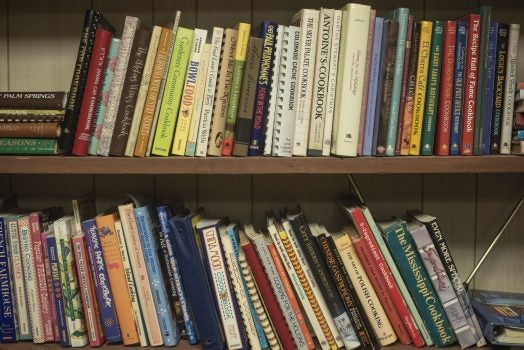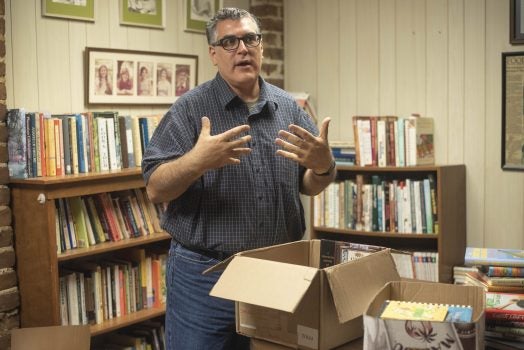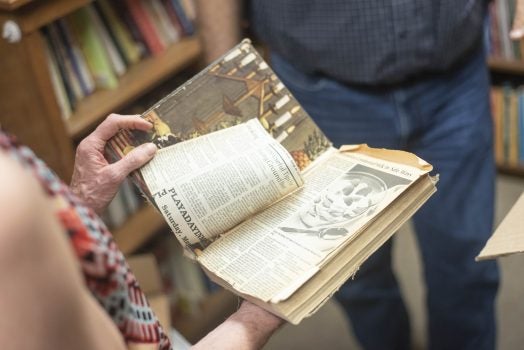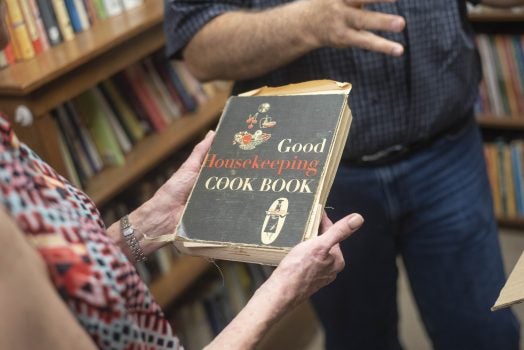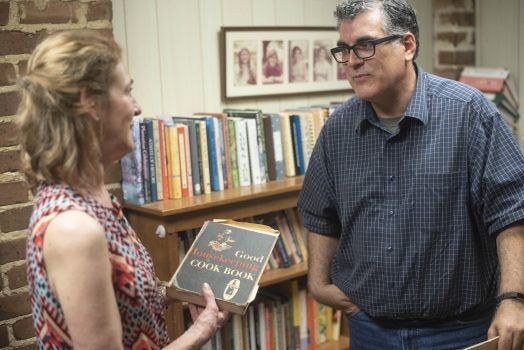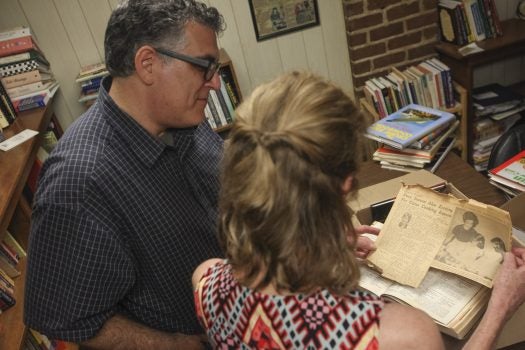COOKING UP HISTORY: USM educators gather Laurin Stamm’s cookbooks for project
Published 8:17 pm Tuesday, September 18, 2018
Laurin Stamm served as the food editor of the Vicksburg Post for more than 50 years.
Stamm was not a chef by trade she was a journalist. Nevertheless, when then city editor Charlie Faulk gave her the assignment to write a food story, Stamm did her job, and as she acknowledged in the introduction of her cookbook, “From the Kitchen of the Cypress House,” which was published following her retirement in 2011, the rest is history.
Stamm, who died in 2016, amassed a mountain of cookbooks through the years from which many of her culinary delights were derived, and last week, Story Ebersole, Stamm’s eldest daughter, turned over her mother’s collection to the Mississippi Community Cookbook project, which is headed up by Dr. Andrew Haley, associate professor of American Cultural History at the University of Southern Mississippi.
“I am so glad they are going to a useful purpose,” Ebersole said. “I could just not be happier. I think Mom would be thrilled, too. Anything to make people want to think about cooking, she loved that,” Ebersole said.
Ebersole said she was made aware of the Mississippi Community Cookbook project after Randy Sherard brought her an article that had been published in “Today in Mississippi” that focused on Haley’s work with the project.
“I would not have found out about the group if it had not been from this article Randy gave me. Randy Sherard was an answer to my prayers,” Ebersole said.
For about five years, Haley, along with USM colleague Jennifer Brannock, who is a professor and curator of rare books, have been collecting cookbooks.
“The initial thought was to focus on community cookbooks between 1900 and 1970, and if we could get those we would have this complete collection of community cookbooks,” Haley said.
Originally, it was thought there were around 100 of these community cookbooks. However, that was not the case and numbers have grown to include approximately 250 community cookbooks, he said, because like in the case of Stamm’s collection, Haley has discovered there are many community cookbooks they were not aware existed.
“Part of it is the books we are seeing that we have never seen before like the Floral Club cookbook in Stamm’s collection, (which was published by the Crawford Street United Methodist Church womens’ group) because I just didn’t know about it,” Haley said.
The Mississippi Community Cookbook project, Haley explained, is more than just gathering recipes from yesteryears. It also serves as a means of documenting Mississippi history, and specifically, women’s history.
Often, recipes only tell you so much, Haley said, it is the other “stuff” that can reveal the cultural make up of groups, for instance “if recipes reflect farm grown dishes or ethnic dishes, dishes that may be associated with soul food or black food.”
“All of these things begin to tell a story,” Haley said, in addition, cookbooks may have poems, town histories and in some cases names of those who produced the cookbooks, which would reflect those who were active in the community.
“So it becomes a roster of activism that nobody really thought about,” Haley said, which is a part of history that has been ignored for a long time.
In going through Stamm’s collection, Haley said he was amazed at its diversity.
Not only did Stamm’s collection include local and state cookbooks, she also had cookbooks from other areas of the country.
“A cookbook on Pennsylvania Dutch recipes — you may think that’s weird,” Haley said. “So what was the interest? The fact that people in Vicksburg cared about these fads that did not have to do with Vicksburg is part of the interesting story unto itself.”
Looking at the cookbooks Stamm was reading and paying attention to, Haley said, “You don’t just think about the collection, you can get a better understanding of those who were influential in the community and helped shaped the way Vicksburg thought about its food.”
In addition to the treasure trove of cookbooks, Ebersole was also donating her mother’s scrapbooks, which included many of her weekly columns.
“In the cookbook all we get are their recipes but here we have additional stories,” Haley said.
“Mom was a journalist, and when people would have bake sales or turkey dinners, she would feature all of these,” Ebersole said.
Stamm’s columns included the Lebanese, African American, Jewish and German cultures — all ethnic groups within the River City were highlighted in her columns through the years.
“I think what your mother was doing on a very conscience and political level was what some of these other community cookbooks were doing on a kind of less thoughtful level, but were accomplishing the same thing. They were creating a sense of community by including the diversity of recipes,” Haley said.
“And I think in a few cases, like your mother, there were cookbooks designed to create an ideal for the community to live up to. The second community cookbook to have been published in Mississippi is from Laurel, and it included northern recipes where people had been brought down, but they had southern recipes as well to bring them together, basically saying through the cookbook, ‘this is all of our community and what we are,’” Haley said.
“That sounds like what your mother was doing by including different ethnic groups who might be ignored otherwise and saying they are part of our community — that is an immensely powerful thing to do and we don’t give credit to the food editor for having a purpose. We just think of it as entertainment, so I think that was amazing,” he said.
Brannock said when collections like Stamm’s are donated, they make sure they are linked together.
“We will link them all by name, so this collection will be donated in memory of Laurin Stamm and what we do is you can go in and do a catalog search for her name and it will bring up her entire cookbook collection,” Brannock said.
“Hopefully the collections serve as a memorial,” Haley said. “Jennifer worked hard for our library to keep them as a collection, because most libraries don’t do this.”
Since its inception, five years ago, Brannock said the Mississippi Community Cookbook project has expanded to include cookbooks written past 1979 and even outside the state with between 4,000 to 5,000 cookbooks.


